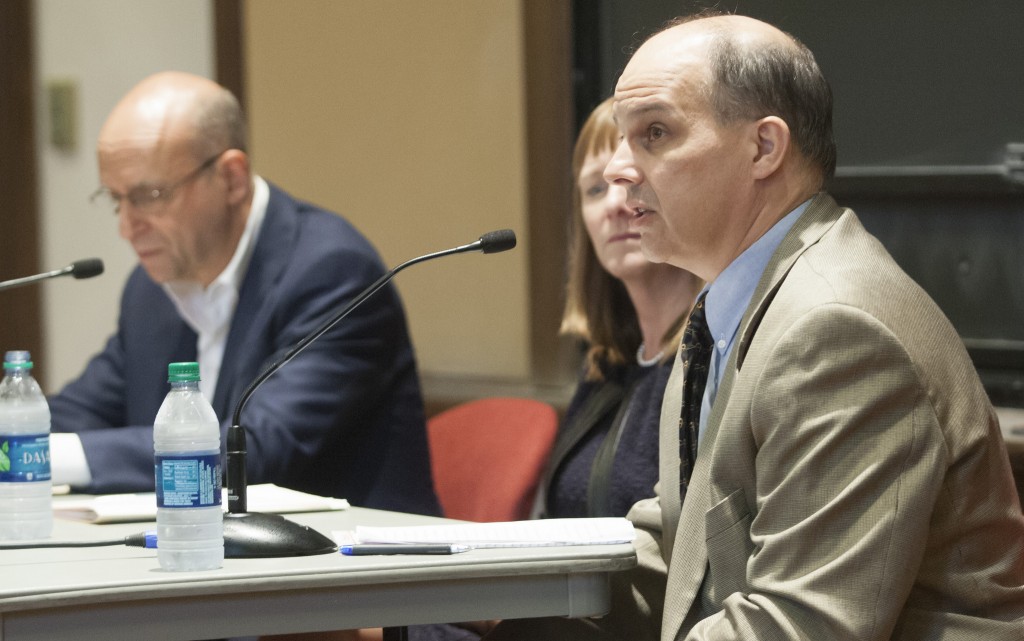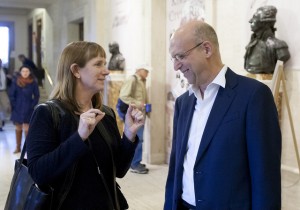On October 1, President Byerly joined Professor Neil Fraistat, Director of the Maryland Institute for Technology in the Humanities, and Professor Paul Barclay (History, Asian Studies) for a public conversation about Digital Humanities, and more specifically, how DH fits into the liberal arts. The event was sponsored by Skillman Library and the Digital Humanities Steering Committee and is part of an ongoing initiative to enrich digital scholarship on campus.
With the benefit of a $700,000, four-year grant from the Andrew W. Mellon Foundation, the Steering Committee has launched a number of new initiatives on campus, including the DH Summer Scholars internship and DH in the Classroom program. These initiatives are in addition to their continued support of large-scale faculty research projects. The broad spectrum of these programs reveals the Committee’s goals of creating a holistic approach to Digital Scholarship that fosters collaboration across disciplines through project-based learning. In addition, these programs work to build a reciprocal relationship between teaching and research in which digital methods open new research questions while transforming the nature of engagement with humanistic objects of study for both students and faculty.
Professor Fraistat joined us to discuss the future of these initiatives as we work to strengthen digital engagement with research and the curriculum. The event prompted an energizing conversation that elucidated the shared goals of the college, the steering committee, and the field of Digital Humanities.
We have included here the full transcript of Professor Barclay’s opening remarks and we look forward to continuing this conversation with the Lafayette community.
Opening Remarks by Paul D. Barclay
Good afternoon. Thank you everybody for taking time out of your busy Thursdays to attend this forum. My name is Paul Barclay—I’m a member of the history department–and I’m here today as the chair of the Steering Committee for the Andrew Carnegie Mellon Foundation Digital Humanities grant. This four-year $700,000 grant was awarded to Lafayette College to promote and develop methods for Digital Humanities Teaching and Research. We are currently beginning year three of the grant-period. I’d like to thank Dean of Libraries and Director of the Mellon grant Neil McElroy for orchestrating this event. It also gives me great pleasure to introduce President Alison Byerly, who joins us this afternoon in her capacity as a Professor of English, and noted participant in the national conversation about the place of Digital Humanities in higher education.[1] Last, but of course not least, we are joined by our keynote participant Professor Neil Fraistat, from the University of Maryland. Professor Fraistat is an organizer, advocate, and leading figure in the digital humanities movement. He is currently director of the Maryland Institute for Technology in the Humanities, and has served as Chair of the international Alliance of Digital Humanities Organizations. Professor Fraistat is a founder and Co-Chair of centerNet, an international network of digital humanities centers as well. I should also mention that Neil Fraistat is prolific scholar in his own right, in addition to his multiple national leadership roles.
A full account of Professor Fraistat’s publications and projects would exhaust our 90-minute program, but I’ll give you a few highlights to indicate his range of interests and accomplishments. He has published widely on the subjects of Romanticism, Textual Studies, and Digital Humanities in such journals as PMLA, Studies in Romanticism, Digital Humanities Quarterly, and Literary and Linguistic Computing. He is also author of the books The Poem and the Book, Poems in Their Place, and The “Prometheus Unbound” Notebooks, and he is the coeditor of Reimagining Textuality: Textual Studies in the Late Age of Print; The Complete Poetry of Percy Bysshe Shelley (3 vols. to date, and counting); and the Norton Critical Edition of Shelley’s Poetry and Prose.
The Steering Committee thanks you heartily for coming to Lafayette College to share your wisdom and experience with us, and to inspire a new generation of digital humanities scholarship.
Our goal this afternoon, as a panel, is to initiate a discussion with members of the audience about Digital Humanities in the four-year college setting. I’ll make a few prefatory remarks. Then Professors Byerly and Fraistat will each speak for about ten minutes, to provide a context and provoke questions and comments around the issue that brings us together today. Namely, What might a liberal-arts college model for the Digital Humanities look like?
So first off, what is digital humanities anyway? I would consider any approach to humanities scholarship that involves the use of digital tools to query, systematize, analyze, or visualize data, to be Digital Humanities scholarship. From my viewpoint, and we can argue about this in the discussion, digital humanities projects harness the power of computers to ask questions, discern patterns, discover relationships and solve problems that are otherwise nearly intractable. Although digital tools make new modes of inquiry possible, and this is important to emphasize from the outset, they do not necessarily save time—digital humanities research is not in its essence a way to use programming and machines to expedite research that would have taken longer using analog techniques. In fact, as pioneering digital humanities scholar, and previous keynote speaker in this series Willard McCarty has noted, DH projects complicate our approach to texts and data. They are by their nature labor-intensive.[2] Often, it is the collaborative and team-based labor that goes into making texts, images and other materials machine readable, for the purpose of humanistic inquiry that provides the biggest intellectual pay-offs. My own work with librarians, students, and other faculty on digital humanities projects has borne out Professor McCarty’s contention.
Before the Mellon Grant commenced in the fall of 2013, Lafayette College’s Digital Scholarship Services Division had already launched a number of long-term faculty projects. Director Eric Luhrs is here with us this afternoon, and will able to field questions or add more detailed accounts of various projects in the discussion portion of the program. But for now, I’ll just outline the core mission of Digital Scholarship Services at the college.
As a rule, faculty DH projects built in conjunction with Digital Scholarship Services are generative, to borrow a term from Edward Ayers. “Generative,”[3] in this instance, means that DSS projects are made public so that they can be used by anyone with an Internet connection to discover their own patterns and relationships, or draw new inferences, from the texts, images, and other materials that form the core of a faculty DH project. Academic integrity and persistence are other important concerns of the division. The Digital Scholarship Services division launches and maintains DH projects that other scholars can reliably cite with confidence, in the knowledge that this information will be accessible for the foreseeable future. Thus, faculty DH projects require a long-term commitment to digital preservation, which of course involves resources and labor.
In the course of implementing these long-term faculty DH projects, dozens of Lafayette students have been brought on board as researchers, coders, programmers, and translators. These projects are also used in classrooms. So, while the projects are faculty-led and inspired, they do end up having a large impact on students. For the purposes of these prefatory remarks, I call this the “generative scholarship” model for Digital Humanities in a Liberal Arts College.
A more student-centered model, which has demonstrated a number of synergies with the longer-term faculty-led projects, has gained quite a bit of traction in the past year. In large part thanks to the Mellon foundation grant and our DH Post Doc Emily McGinn, a thriving student-led Digital Humanities scene can be said to exist at Lafayette College as we head into year three of our grant period. These are projects designed from the start for classroom use, or as student research projects. “Student-centered” projects do not require the customized programming, or long-term digital preservation, and these projects have considerably widened the scope of DH scholarship at Lafayette College. As a result of this newer approach, we can now say that our classroom projects have reached 14 classes across 9 departments, and over 10% of the student body and 15% of the total faculty have worked on DH projects in some manner.
In my mind, each of these models—the “generative” and “student-centered”—has helped us put the teacher-scholar ideal into practice at Lafayette College. To date, they have complemented each other well, with personnel and projects from one side crossing over to the other as occasion dictates. One of the purposes of tonight’s forum is to maintain the momentum, and to garner support, so that our efforts to build a “liberal-arts college model for the Digital Humanities” at Lafayette College can thrive well beyond the life of this four-year grant-period.
[1] See Alison Byerly, “Digital Humanities, Digitizing Humanity,” Educause Review (May/June 2014), 8-9.
[2] Willard McCarty, “Getting there from here. Remembering the future of digital humanities Roberto Busa Award lecture 2013,” Literary and Linguistic Computing 29, No. 3 (2014), 289.
[3] Edward L. Ayers, “Does Digital Scholarship Have a Future?,” Educause Review (July/August 2013), 34.


